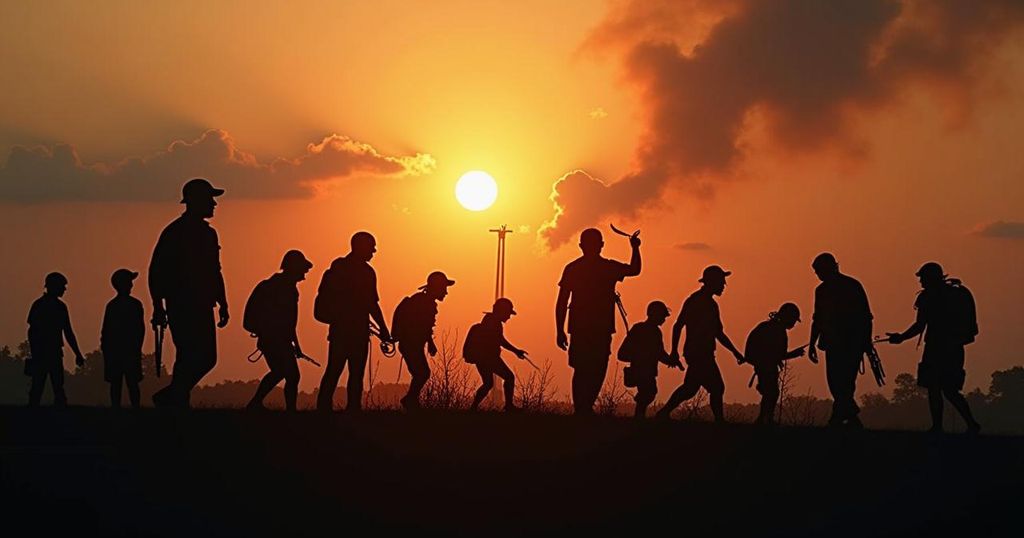Six Migrants Killed by Mexican Soldiers Near Guatemalan Border
Six migrants from Egypt, Peru, and Honduras were killed by Mexican army troops while traveling in a truck near the Guatemalan border. The incident has drawn international condemnation and calls for investigation into military actions against migrants. Amidst strained relations between Peru and Mexico, President Claudia Sheinbaum described the shootings as “deplorable,” with investigations ongoing.
MEXICO CITY (AP) — In a tragic incident near the Guatemalan border, Mexican army troops opened fire on a truck transporting migrants, resulting in the deaths of six individuals from Egypt, Peru, and Honduras. President Claudia Sheinbaum labeled the event as “deplorable,” acknowledging that three of the deceased were Egyptians, with one each hailing from Peru and Honduras, while the fifth victim’s identity remains unknown; it is believed that at least one of the deceased may have been a minor. In this incident, ten additional migrants sustained injuries, although their current conditions have not been disclosed. The Peruvian government confirmed the death of one of its nationals and has demanded a thorough investigation. Relations between Peru and Mexico have been strained following a diplomatic incident in 2022. President Sheinbaum reported that the two soldiers involved in the shooting had been handed over to civilian authorities for interrogation, although no formal charges have yet been brought against them. This marks a significant escalation in violence against migrants, being the most severe occurrence since 2021 when police killed seventeen migrants in Tamaulipas. President Sheinbaum indicated that the investigation would examine the actions of military commanders to determine if further accountability is necessary, insisting that such incidents must not recur. However, the focus on these matters seemed sidelined during a later ceremony, where army and navy commanders pledged loyalty to Sheinbaum, who emphasized the absence of human rights violations in Mexico and announced wage increases for military personnel. The incident unfolded near Tapachula, Chiapas—an area notorious for migrant smuggling and drug cartel activity. The Mexican Defense Department initially claimed soldiers opened fire after perceiving gunfire directed at their position from three trucks evading an order to stop. However, the Attorney General’s Office later indicated that all trucks were fleeing when pursued by military personnel. Authorities reported discovering thirty-three migrants within the stopped trucks, originating from Egypt, Peru, Honduras, Belarus, Nepal, Cuba, India, and Pakistan. The Defense Department confirmed that four migrants were killed and twelve were injured, with two later succumbing to their wounds. Reports indicate that all deceased died as a consequence of gunshot wounds, yet it remains unclear if the fatalities were caused by the army’s gunfire. The area has previously seen confrontations involving drug cartels, leading experts to suggest that the trucks might have resembled those utilized by criminal organizations. Two soldiers implicated in the shooting have been reassigned pending investigation, as any civilian-related incidents warrant civilian prosecution, though military personnel may also face court-martial for such actions. Irineo Mujica, an advocate for migrant rights, expressed skepticism regarding the notion that migrants or their smugglers initiated gunfire, stating, “It is really impossible that these people would have been shooting at the army. Most of the time, they get through by paying bribes.” The Mexican Council of Bishops condemned the violence as “a disproportionate use of lethal force,” asserting that this incident should not be considered isolated. If it is confirmed that the shots were fired by soldiers, it may create significant political fallout for President Sheinbaum, as she has continued the policy trends set by her predecessor, focusing considerable power on the military in the context of law enforcement and other state functions. This shooting is not unprecedented; similar incidents have previously occurred, raising concerns over military engagement against vulnerable migrant populations. In 2021, a National Guard unit shot at a vehicle carrying migrants, leading to one fatality and multiple injuries. Initial claims of being fired upon by migrants were later refuted by an independent investigation. The current situation reflects a broader crisis, as the Mexican armed forces have increasingly become involved in migratory operations, often leading to violence and the loss of innocent lives linked to the lucrative business of human smuggling.
The incident involving the deaths of six migrants in Mexico underscores a larger, persistent crisis concerning the treatment of migrants in the country. Mexico became a significant transit point for migrants from various parts of the world, particularly Central and South America, as they attempt to reach the United States. This situation is compounded by growing tensions between state forces and migrants, often resulting in instances of violence. President Claudia Sheinbaum, who recently took office, is facing scrutiny and pressure for her administration’s approach to handling migrant security and welfare. The event has drawn international attention, prompting calls for investigations and discussions about human rights concerns, particularly as Mexico’s relationship with neighboring countries, such as Peru, remains strained due to previous diplomatic wranglings.
The tragic shooting incident near the Guatemalan border that resulted in the deaths of six migrants from Egypt, Peru, and Honduras has raised serious concerns regarding the treatment of vulnerable populations by military forces in Mexico. As investigations proceed, the accountability of military personnel involved in the incident will be crucial in addressing the systemic issues surrounding migrant safety. Calls for urgent reform and heightened scrutiny of law enforcement practices are likely to intensify following this tragic event, which highlights the complex interplay between migration, military operations, and human rights in the region.
Original Source: apnews.com




Post Comment